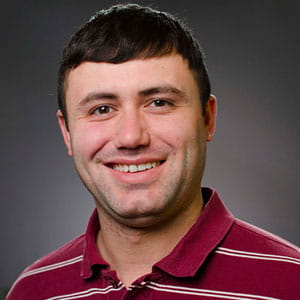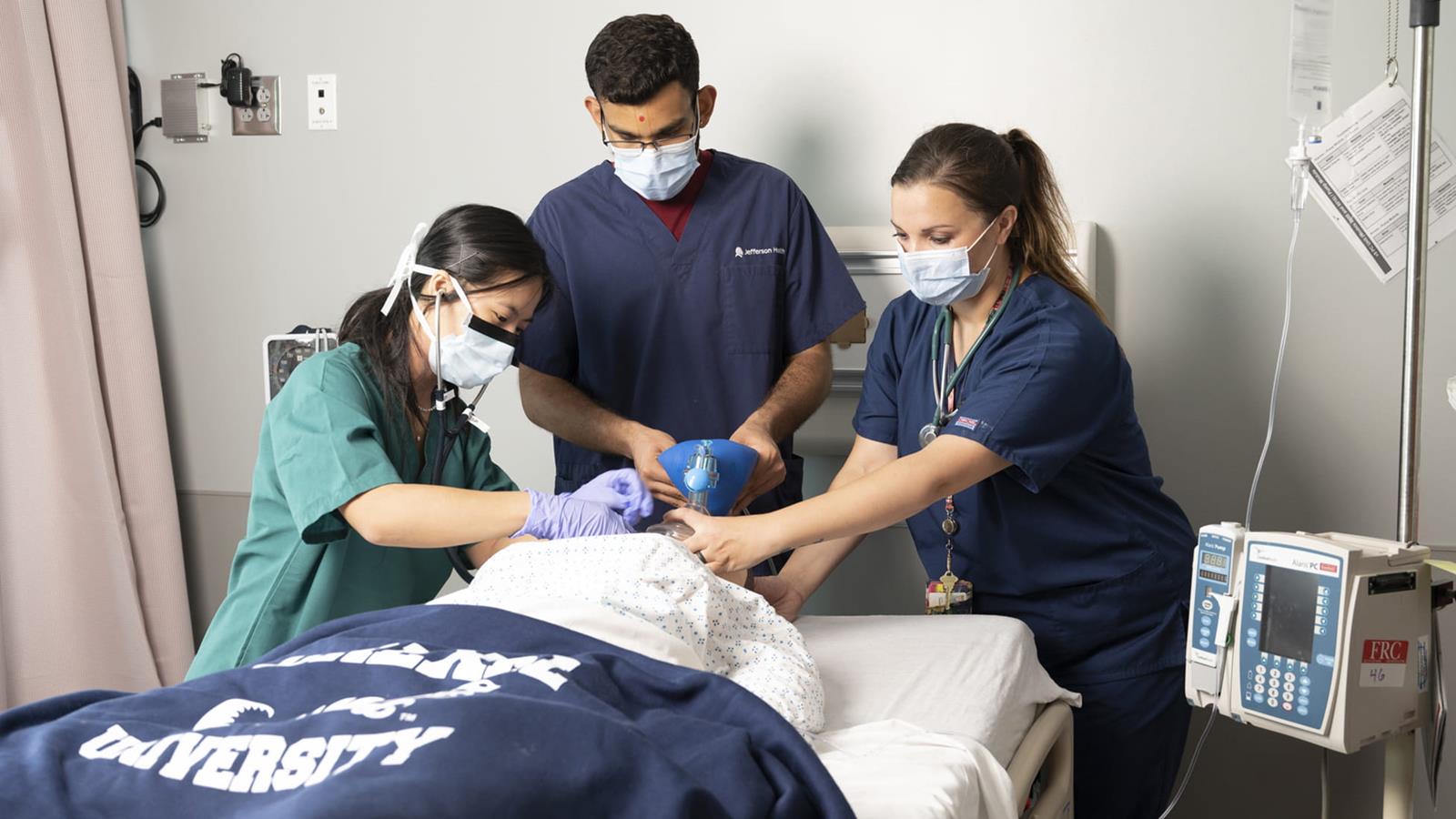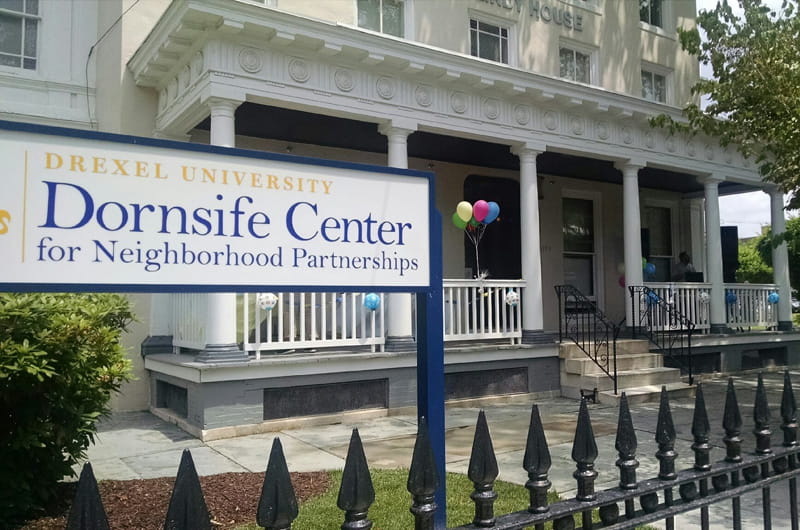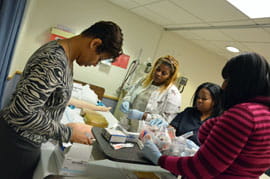Drexel's Focus on Hiring in its Neighborhoods
 By Frank Otto
By Frank Otto

- Drexel’s College of Nursing and Health Professions Receives $1 Million for Scholarships from the Bedford Falls Foundation – DAF to Address Nursing Workforce Shortage
- Laura Turner to Join Drexel University as Senior Vice President for Institutional Advancement
- When the World Changes, Drexel Changes With It
- U.S. Department of Education Provides Final Approval of Drexel and Salus Merger
Mantua resident Myna Whitney sometimes thinks about what Robert Frost immortalized as “the road not taken.”
“I find myself thinking where I would have been or who I would have been,” she said. “But I will never know. And I’m OK with it because I like who I am.”
The road that Whitney did take was one that made her a certified medical assistant in Drexel Gastroenterology. She credits Drexel’s outreach into its surrounding neighborhoods for her ability to take that path.
“If it were not for them, I wouldn’t be in this position right now,” Whitney said.
A Workforce Waiting in the Neighborhoods
Whitney is one of a growing number of minorities and other residents from Drexel’s nearby neighborhoods like Mantua and West Powelton who now work at the University. Through its local hiring programs and outreach initiatives, Drexel is helping to support prosperity in West Philadelphia and ensure that the University’s workforce is representative of the community and the world around it.
Neighborhoods around Drexel are a piece of an area President Barack Obama designated as a “Promise Zone” last year. This Promise Zone is one of five regions in the country with persistent poverty that will now be eligible for economic improvement through federal grant opportunities.
Drexel’s hires from these neighborhoods and West Philadelphia are at a nine-year high. Approximately 404 Drexel faculty and staff members live in West Philadelphia, roughly 8.4 percent of the University’s employees.
Minorities make up at least 207 of those employees, approximately 51 percent of the West Philadelphians working at the University.
With last year’s opening of the Dornsife Center for Neighborhood Partnerships and the continuation of older job placement initiatives, Drexel is in a good position to aid keep those numbers growing.
A Focus Under Fry
Hiring locally has been a focus of President John Fry since he came to Drexel and announced his intention to make it “the most civically engaged university in the country.”
“It’s all about economic opportunity,” said Vice Provost of University and Community Partnerships Lucy Kerman. “Under John Fry, we’ve been focused on this for four years.”

Kerman’s office manages the Dornsife Center, which has become the heart of the University’s community outreach. The center hosts job prep training and counseling for local residents, and serves as a connection between the university and campus jobs.
The programs are open to all residents, minority and non-minority alike.
Judy Walterson is one long-time West Powelton resident who recently took advantage of Drexel’s pro-local hiring goals. Walterson had been afraid she might get overlooked by employers, but now works in Fry’s office as an administrative coordinator.
“I was happy to apply to Drexel knowing President John Fry’s commitment to community outreach,” Walterson said. “It makes me proud to work at Drexel.”
Walterson first became acquainted with opportunities at Drexel through a job fair at the High School of the Future several years ago, where she met Sarah Steltz, Drexel’s associate director of University and Community Partnerships. When Walterson went on the job market recently, she got back in touch with Steltz.
“She recommended that I attend the Thursday open hours with Drexel Human Resources at the Dornsife Center. Knowing that a personal connection is crucial to getting a job, I stopped by and met with Courtney Price,” Walterson recalled.
Price, a workforce development specialist, helped point Walterson to potential jobs at Drexel and recommended her for the positions.
“It provided a personal connection that I could not often find when applying to other jobs in other places,” Walterson said. “It makes the difference between my résumé getting attention versus being thrown into a pile with 200 others.”
The Pipeline
Steltz runs the Medical Assistant Pipeline, from which Whitney got her job. Offered in collaboration with the University City District’s West Philadelphia Skills Initiative (WPSI), the program has been one of Drexel’s most successful community hiring projects.
The program stems from high turnover among medical assistants at the College of Medicine and the fact that there was an abundance of West Philadelphia residents with medical assistant certifications. The pipeline addressed those issues by helping place the residents who already had medical assistant certifications at the College of Medicine.
“I said, ‘Maybe we can think about the diversity and business needs in a way that can be mutually beneficial,’” Steltz said.

The pipeline was born. Altogether, 33 positions have been filled through the program by providing training to residents as well as advice and support as they phased in to their new roles.
“They made it very easy for me to transition into my role at Drexel,” Whitney recalled. “Sometimes people can feel intimidated when starting a new job because it’s a new role with new people, but some of my instructors were actually employees already and were able to tell me what to expect. When I came in, I wasn’t shy — I was ready.”
Supervisor training was something Steltz identified as a need through the pipeline.
“I think that really made a difference,” Steltz said. “The employees were ready to work, and the supervisors were ready for their new staff.”
Moving Forward With Partners
The pipeline has attracted quality employees and improved retention. It worked so well that the basic model was modified to focus on helping fill job positions with Drexel’s outside vendors, such as SodexoMAGIC, which runs campus dining. The training for these positions will take place at the Dornsife Center.
“We are thinking creatively about other opportunities,” Steltz said. “The Dornsife Center is a living thing, it’s always changing based on the community’s needs.”
And those needs must sync up to real business needs to make the efforts successful.
“This is about business. It’s about high-quality employees and a good workplace,” Kerman said. “It’s not charity or outreach for the sake of outreach.”
Whitney’s connection to Drexel doesn’t just end with her job, either. She’s currently also a general studies student at Drexel with plans to become a nursing student, made possible by savings from working at the University.
“This opportunity has given me another shot at a college education and a chance to become what I really want to be: a registered nurse,” she said. “I may wonder about what my life would have been without this program, but I just can’t picture it. What I have now is too precious to me.”
In This Article
Drexel News is produced by
University Marketing and Communications.